
:
Here's a list of Top Project Management Trends for 2020:
- Artificial Intelligence and Automation
- Data Analytics and Business Intelligence
- Hybrid Methodologies of Project Management
- Virtual or Remote Team Management
- Emerging Project Management Tools and Techniques
- Soft Skills and Emotional Intelligence
- Continuous Learning
Project management is a practice to initiate, design, execute, monitor, control, and close a project within cost and schedule constraints. The main challenge of project management is to achieve all project objectives within the given limits.
Managing a project was quite challenging and difficult a decade ago due to a lack of project management tools and insufficient resources. The projects were smaller and simpler compared to current projects.
According to PMI’s Pulse of the Profession - Success in Disruptive Times 2018,
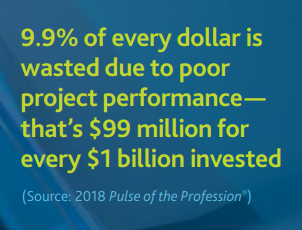
The field of project management is evolving with advanced technologies, tools, and emerging trends. The trends are meant to be implemented. Irrespective of the size of the project, the implementation of the latest project management trends is vital for the development of the organization.
Here is a list of the most prominent project management trends for 2020.
1. Artificial Intelligence and Automation
The hype for Artificial intelligence (AI) is alive since 2018. The main purpose of project management is analyzing risk, reducing cost, minimizing the repetition, ensuring smooth project flow, delivery on time and within budget.
The role of project managers is to monitor and manage the project with minimum repetition work and excellent decision-making skills. There are many project activities involved to successfully complete the project.
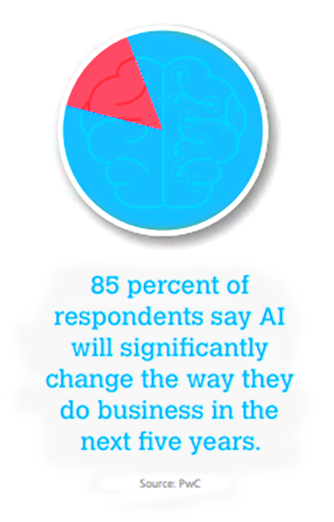
Irrespective of the size of the project, there is always uncertainty. Risk-based probability management is always challenging for humans. The uncertainty can be reduced by using AI, machine learning and predictive analysis.
By 2030, 80 percent of the work of today’s project management (PM) discipline will be eliminated as artificial intelligence (AI) takes on traditional PM functions such as data collection, tracking, and reporting.
By 2021, 70 percent of organizations will assist their employees’ productivity by integrating AI in the workplace.
Humans face challenges while handling complex data. Artificial Intelligence plays a vital role in minimizing human interference in day to day work.
In Project management, AI can be useful in,
- Early prediction of risks
- Eliminating repetitive work
- Improved project analysis
- Increase inefficiency
There are many tools and technologies of artificial intelligence used in project management:
-
Knowledge-based expert system (KBES):
The combination of knowledge Base and Inference Engine, KEBS is a system created by collecting the facts and opinions from the subject matter expert (SMEs).
KEBS is used to provide the resource requirement and estimates of the duration for project activities based on the information by SMEs.
-
Artificial neural network (ANN)
Artificial neural network (ANN) is a machine learning approach that has the ability to learn, generalize from the data and use the data the same as the human brain.
ANN is used to sequence the project activities based on the requirements.
ANN helps in predicting cost overruns based on project size, the competence of project manager and type of contract used.
ANN estimates the probability of occurrence of risk by allowing a quantitative approach to risk analysis.
-
Genetic Algorithms (GA)
Genetic algorithms (GA) is an iterative search method based on the social behavior of the species or humans. It uses the natural evolution process to bring out the optimum solution to the large scale problems.
GA uses the natural evaluation process of selection, mutual decision and cross over to arrive at a decision.
GA in project management is used to optimize the schedule of project activities within constraints in order to reduce the cost.
-
Fuzzy Logic
The logic computing by which we can determine the “degree of truth”. Fuzzy Logic helps to prioritize the project activities.
Fuzzy logic is used to assess risk in the project to model the probability distribution.
AI and automation are not taking over the project manager’s jobs. It is just making the process simpler.
Project managers getting familiar with AI and automation will make work much simpler and systematic. With AI and automation, you can deliver the project on time and on budget.
2. Data analytics and Business intelligence
Project management includes a lot of data. Optimizing the business with lots of data is quite challenging. Project-based data are sometimes complex. In order to observe, measure and analyze the data, data analytics are used. Data analytics and Business intelligence both play a vital role in project management.
By the end of 2020, the Data Analytics and Business intelligence market are forecast to grow to $22.8 billion.
By using the data analytics, project managers will be able to know the magnitude of the information available, performance of the project which will help project managers to make strategic decisions.
Project managers can use analytical reports to breakdown complex data into insights. These insights from data analysts are sent to project managers or decision-makers.
According to Gartner, the top ten technology trends in data and analytics are:
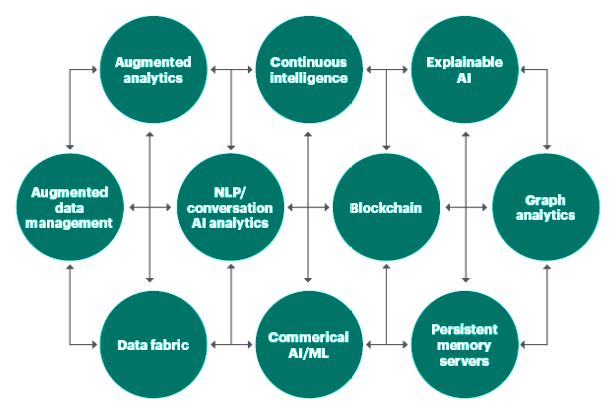
Project managers are more focussed and continuously engaged in facing strategic and operational challenges. The project managers aim to make the project more effective with efficient resources within budget.
Poor project management can lead to cost overrun and delay in completing the project than expected.
Effectiveness in project management can be increased by business intelligence. Business intelligence can help project managers in 4 ways.
- Business intelligence can automate the processes
- BI helps to predict risks
- BI controls the cost overrun
- BI provides more reliable and accurate data
The trending software used for Business intelligence are:
- SAP Business Intelligence
- Microstrategy
- Datapine
- SAS Business Intelligence
- Yellowfin BI
- QlikSense
- Zoho Analytics
- Sisense
- Microsoft Power BI
- Looker
According to a survey conducted by Business Application research center, the importance of Business intelligence trends for 2020 by 2865 respondents is shown below:
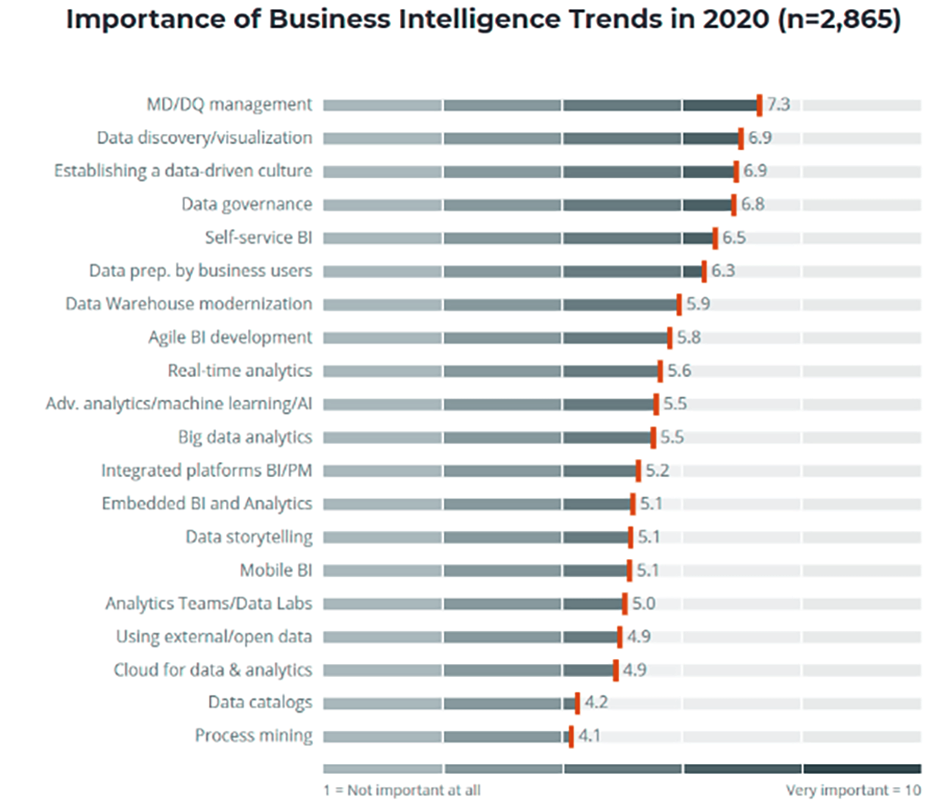
Hence, Master Data Management is the top trend for business intelligence for 2020.
3. Hybrid Methodologies of project Management
Project management methodologies are all about determining how the project should be planned, monitored and executed.
Project management methodologies can be a set of methods, techniques, guidelines, templates and best practices. Generally, a single method is chosen as an end to end solution for executing a project.
Traditional methods are suitable when there are a definite path and well defined final outcome.
Agile methodologies are trending but it is quite challenging to implement it.
Project management requirements along with increasing uncertainty and complexity make it more difficult to choose any one method of project management.
Hybrid methodologies of project management refer to implementing different methodologies together as per the requirement.
Projects are classified based on the following four components which will further decide how projects should be managed.
- Complexity
- Novelty
- Technology
- Pace
Different projects have different requirements. One-size-fits-all solutions do not hold good for all the projects. A multi-dimensional framework is introduced based on the fundamental practices of project management. In order to characterize a project, 14 parameters are considered and three potential levels are identified for each parameter. Based on the results, different project management approaches are proposed.
The multi-dimensional framework includes 14 attributes and 23 different project management approaches derived from the traditional waterfall method, Agile method and Theory of Constraints (TOC).
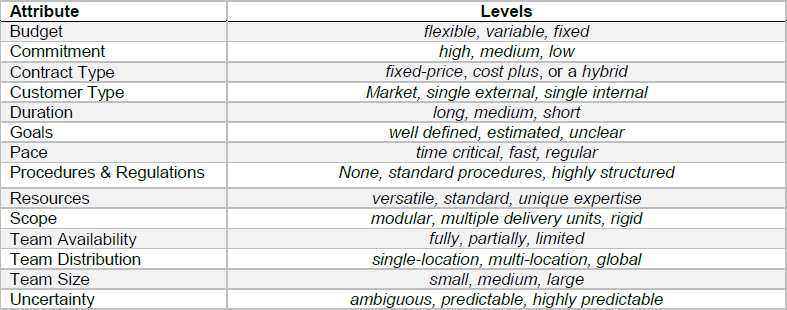
Source: PMI
The below table shows the main approaches identified in the waterfall method, agile method, and TOC.
Source: PMI
Specific projects are characterized based on selecting the appropriate value on each dimension of 14 attributes.
The mapping between the fourteen attributes and different approaches are carried out by project managers.
This results in the successful implementation of project management. PRINCE2 certification can be done along with Agile and Scrum for better understanding and implementation of hybrid technologies.
According to PMI’s Pulse of Profession 2019 11th Global Project Management Survey,
Nearly 60% of Project Management Technology Quotient (PMTQ) Innovators used Hybrid Project Management Practices for successful project completion.
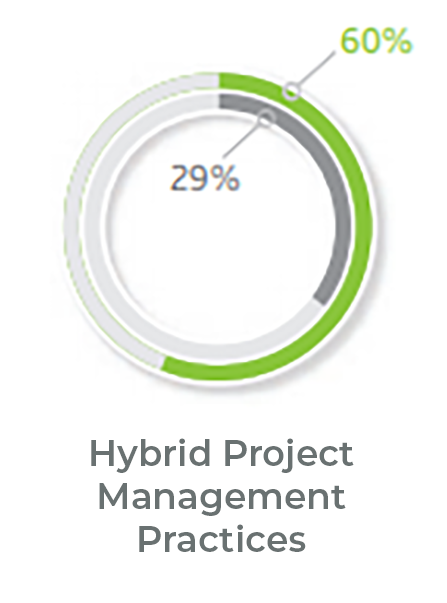
PMTQ is the person’s ability to adapt, integrate and manage technology-based requirements in the organization.
4. Virtual or Remote Team Management
The virtual or remote team is when the project is carried out by the team members working in different locations and virtually. Virtual projects are led by the managers and are one of the top trends in project management due to the rapid development of technology, globalization, increasing outsourcing, and talented resource availability in a different location.
According to The Modern Workplace 2019: People, Places & Technology study by Condeco,
Condeco concluded that remote working is the major trend in America
43% of U.S based organizations stated that more employees are expected to work remotely in 2020.
52% of U.S companies said they offer remote working to increase employee retention.
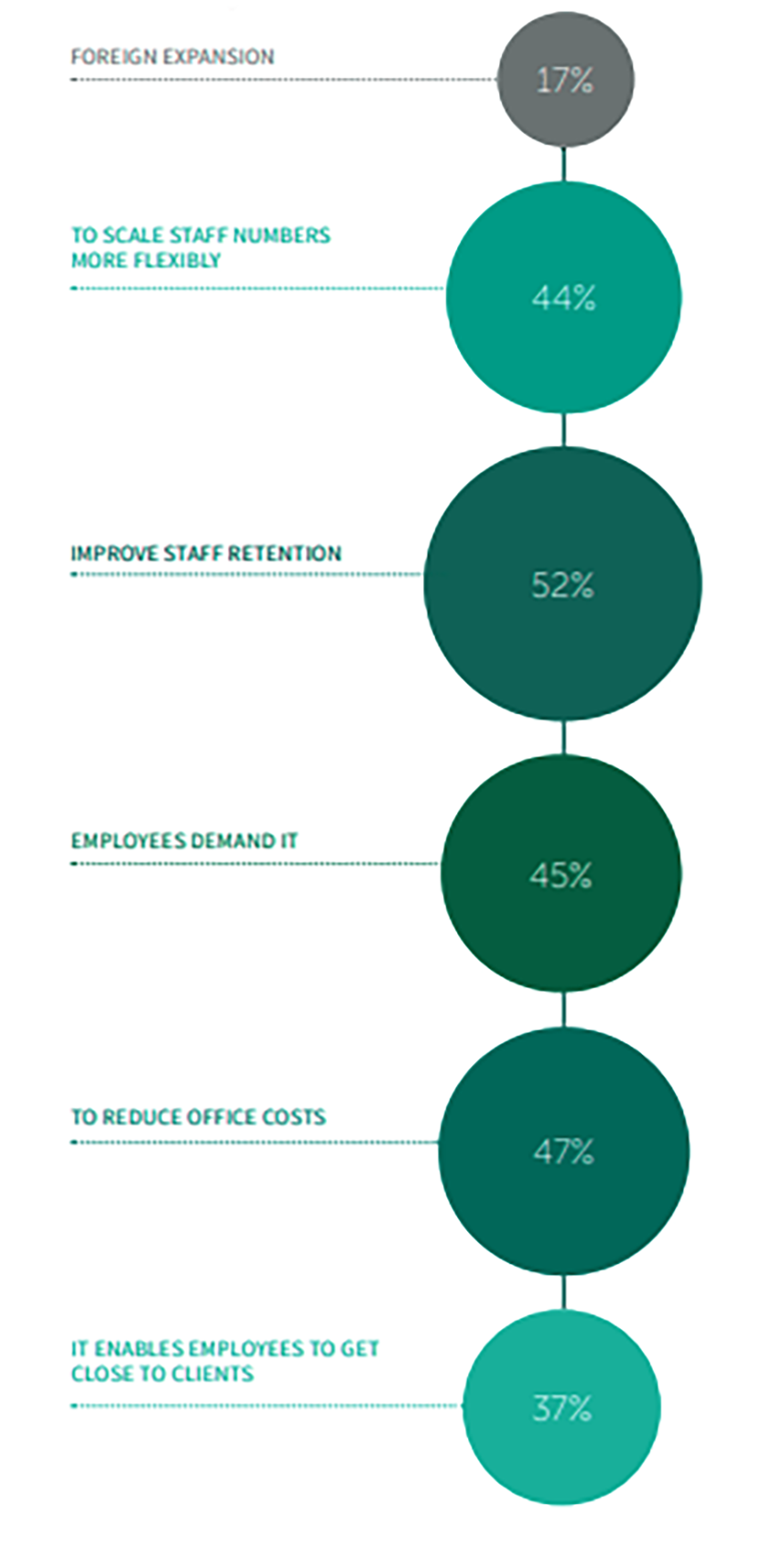
There are many benefits of Remote Working,
- Flexible schedule
- Comfort working from home
- Higher Productivity
- Can avoid commuting
- Better work-life balance
- Better health
- Reduces attrition
- Improves morale
Based on the State of Remote Work-2019,
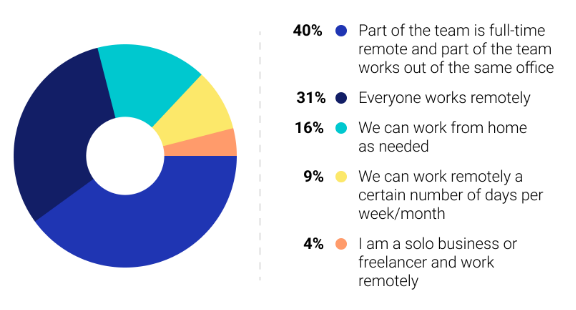
There are many challenges to be faced in managing the Remote team but there are ways to overcome the challenges.
Challenges faced in managing a remote working team:
- Hiring the right resource
- Language
- Setting schedules might be quite challenging
- Difficulty in tracking progress and performances
- Lack of connection with the team
- Lacking appropriate communication
These challenges can be faced by using the best practices and tools:
Best practices to manage remote working
- Encourage transparency in work: Regular communications about the project, project scope, and objective, vision, review of the output. A clear chain of command helps in setting expectations.
- Utilize technology: Reliable, secure and well-equipped technology can ensure effective remote work
- Hiring the right resources: Hiring Self-motivated individual with the required amount of skill can make managing the remote work simpler.
- Arrange events and meetings: Arranging common meetings for the remote team along with the company staff can help them to interact more with other team members.
Tools used for managing remote working teams:
- Slack
- Proprofs
- Basecamp
- UberConference
- Document sign by Adobe
- Zapier
- 1Password
- Canva for work
- Hubstaff
- Process street
5. Emerging project management tools and techniques
Implementing new tools and technologies can ensure project success in every aspect. Project Management Softwares have become an integral part of the projects.
According to PWC,
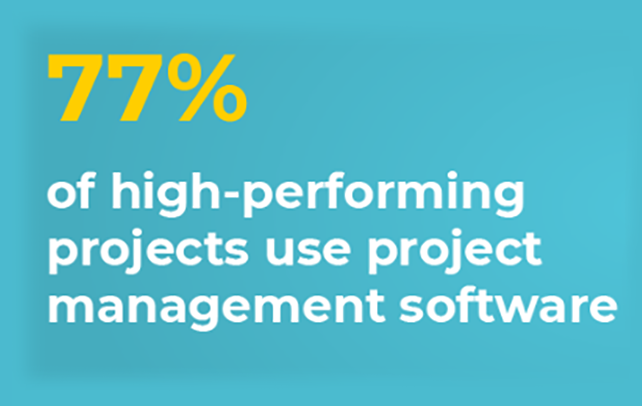
Every project has goals and objectives, to accomplish the goal certain project activities are carried out with effective project management. Project management is quite a complex process. To streamline a process, project management software is used.
According to Mordor Intelligence,
The project management software market is expected to register a CAGR of 10.17% during the forecast period (2019 – 2024).
The top three requirements from project management software are:
- Reliability
- Ease of use
- Ease of Integration
There are two types of project management software available nowadays:
Online: Cloud-based technology with application providers such as SaaS (Software-as-a-Service).
On-Premises: Project management software residing in the company’s own server and is managed by the company’s IT team.
There are many project management software that fulfills all three requirements.
The top reasons to adopt project management software according to the survey conducted by Project-management.com,
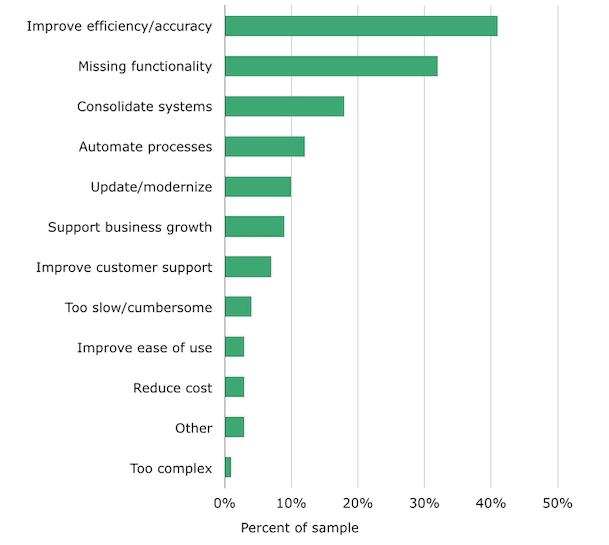
The project management softwares are used for the following function:
- To set a project management plan
- For resource allocation
- Budget
- Schedule management
- Collaboration and communication
- For records and documentation
- Tracking the project progress
The list of top project management tools are:
- ClickUp
- Wrike
- Asana
- Trello
- Workzone
- ProofHub
- MeisterTask
- Monday
- Teamwork
- Podio
Implementing project management tools and software can ensure the completion of all kinds of a project successfully.
6. Soft skills and Emotional Intelligence
Emotional Intelligence is the ability to monitor one’s emotional balance and make decisions using multi-level awareness.
A good project manager does not only possess the ability to manage projects, but also the one who builds a good relationship between team members through emotional bonds.
The project manager should be open to work in a complex matrix environment where PM needs to influence, collaborate and negotiate.
Emotional Intelligence is the key to leadership.
Project management requires,
- A great communication skill
- Must be in tune with team members emotions
- Ability to understand the situation
- Must be aware of the behavior
- Need to motivate the team members
There are five categories to measure emotional intelligence:
- Self-Assessment: Being aware of one’s strengths and weaknesses.
- Self-Regulation: Discipline to control and/or redirect emotions.
- Empathy and Compassion: The ability to feel what others feel and being concerned and helpful.
- Relationship Management: Connecting with others in a healthy way.
- Effective Communication: interacting in an effective manner with decent body language
According to Sodexo, The World Economic Forum identifies Emotional Intelligence as one of the top 10 competencies for 2020
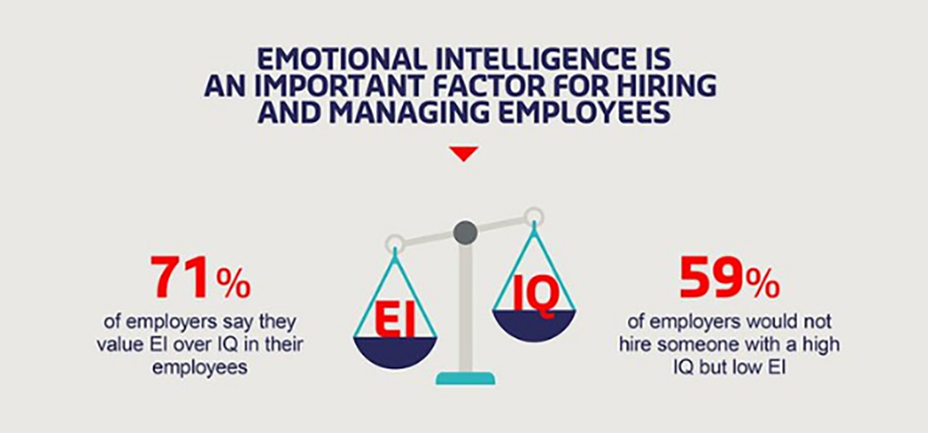
Soft Skills: Effective interaction with clients, team members or management is called a soft skill.
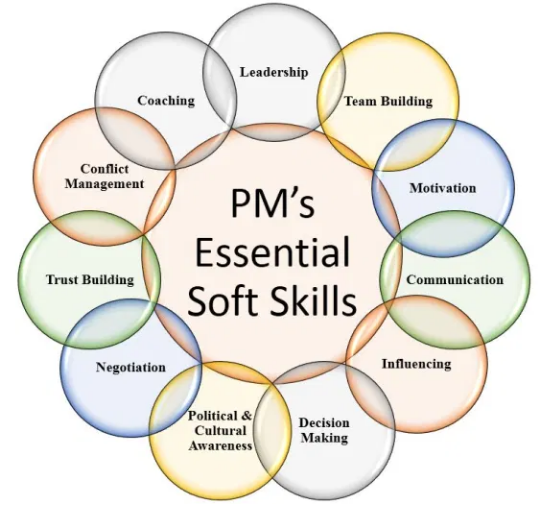
According to PMI’s Pulse of the Profession® in-depth, In SHRM’s report The New Talent Landscape: Recruiting Difficulty and Skills Shortages, HR professionals in organizations that were hiring full-time employees rated the need for new skills for these positions.
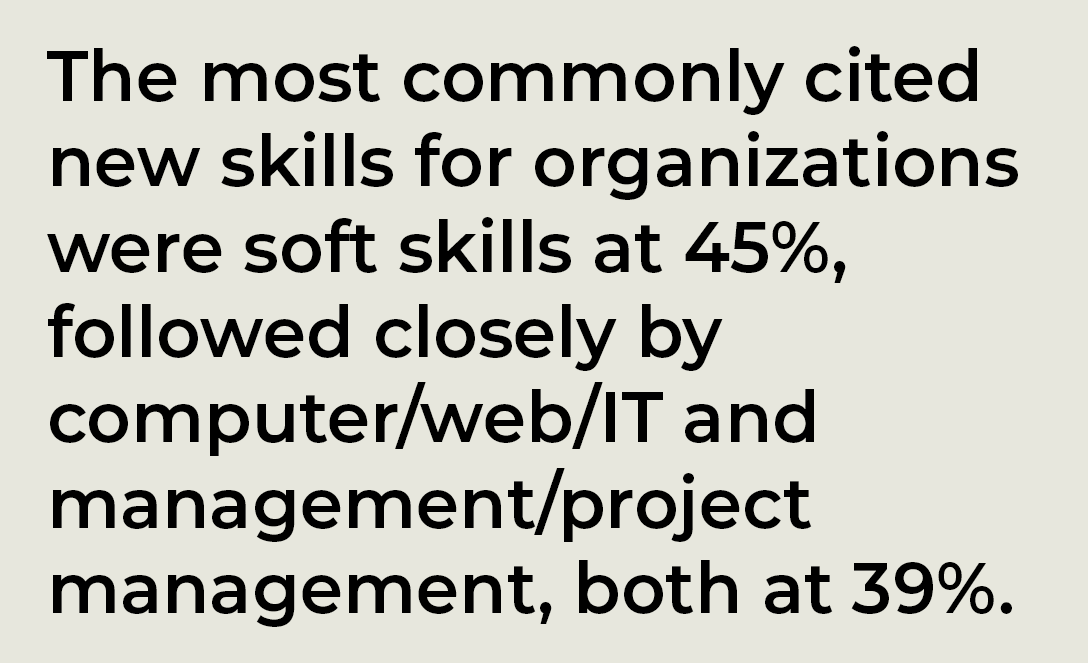
7. Continuous Learning
Learning is never-ending. When any new projects are taken, the organization may adopt new technology to carry out the project. By training the resources with the new technology holds good for both employer and employee. Training the existing employee will help in executing the project successfully and employees are benefited from added skill.
The employee with continuous learning and dedicated to professional growth is an asset to the company.
The employers know the importance of training in project management.
According to PMI’s Pulse Of The Profession,
Three in five organizations provide training on project management tools and techniques
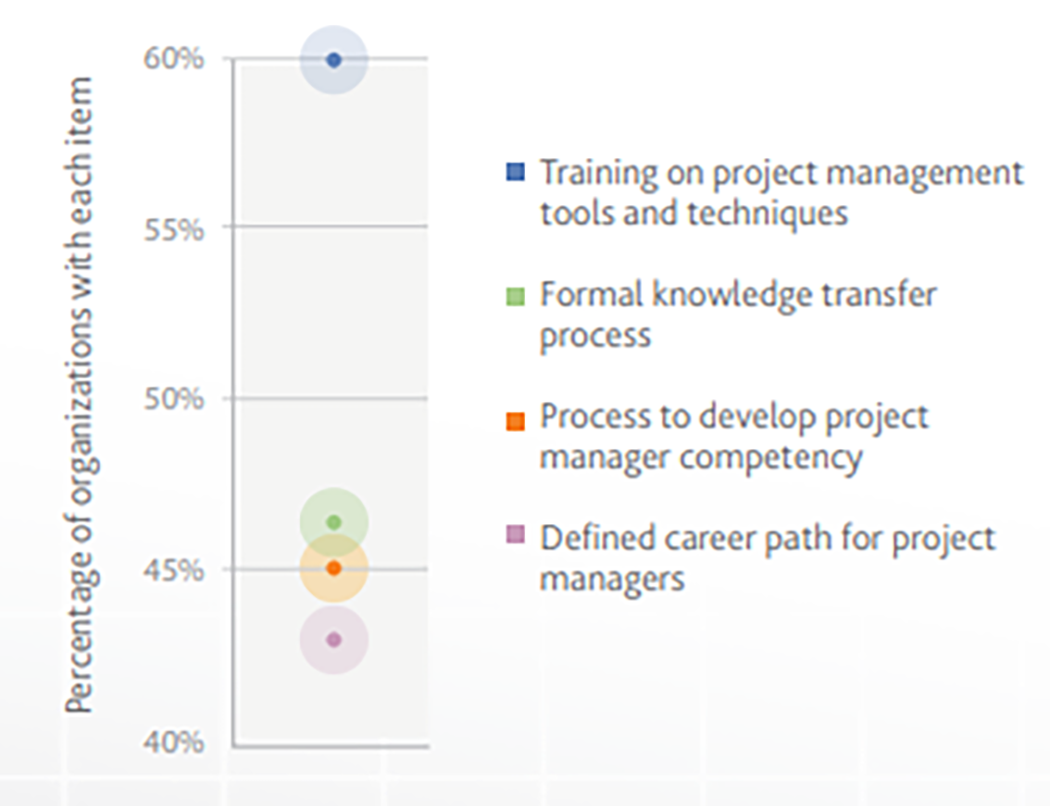
The resources capable of executing the project with added skill also helps in retaining the employee and elimination of hiring new resources.
Training and development not only helps in learning a new skill but also helps in developing the existing skill.
The project management skill developed through courses and certification helps the project managers to,
- Dealing with Change
- People Management
- Stakeholder Management and Engagement
- Communication with Stakeholders
- Communication with Project Teams
- Planning
- Leadership
- Developing Critical Success Factors
- Managing Conflict
- Managing Quality
Typical new skills learned included:
- Active risk management
- Planning, implementing and monitoring projects
- Pert Charts
- Costing
- Detailed knowledge of scheduling
- The Procurement process
- Earned Value Management
According to ILX research report,
63% of the respondents conduct training to improve business capabilities.
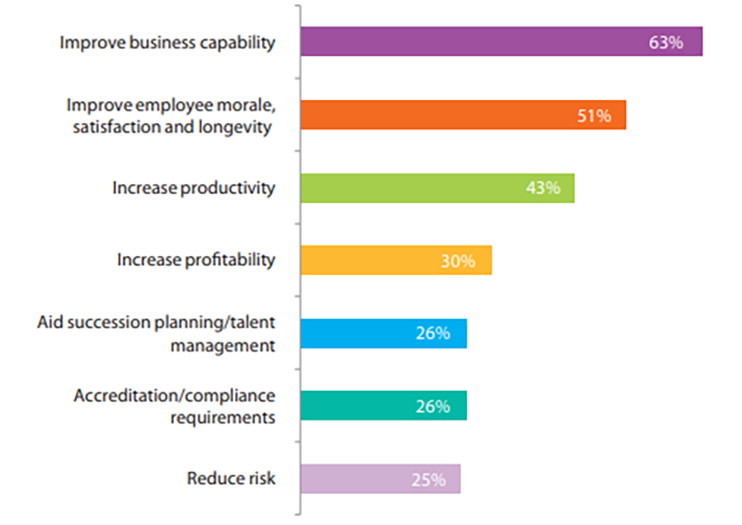
For more information on how you can accelerate your career with these certifications, visit us at https://www.icertglobal.com/ or call now on +1-713-287-1213 / 1214 or e-mail us at info {at} icertglobal {dot} com.
Know more about our Professional Certification Training Courses for preparing for the below mentioned recommended certifications.
Recommended Courses:
- Artificial Intelligence and Deep Learning Certification Training Course
- Machine Learning Certification Training Course
- Big Data Certification Training Courses
- Agile and Scrum
- Data Science Certification Training Courses
- AWS Certified Solutions Architect Certification Training Courses
- Google Cloud Platform Fundamentals Certification Training Courses
- CISSP Certification Training Courses
- CEH Certification Training Courses
- CSM Certification Training Courses
- CRISC Certification Training Courses
- CISM Certification Training Courses
- PMP Certification Training Courses
- CAPM Certification Training Course
- CompTIA Cloud Essentials Certification Training Course
- AWS Solution Architect Certification Training Course
We provide instructor-led classroom and instructor-led live online training across the globe. We also provide Corporate Training for enterprise workforce development.
Visit us at https://www.icertglobal.com/ for more information about our professional certification training courses or Call Now! on +1-713-287-1213 / +1-713-287-1214 or e-mail us at info {at} icertglobal {dot} com.
Project Management Training by iCert Global:
Quality Management Training by iCert Global:
- Lean Six Sigma Yellow Belt (LSSYB) Certification Training Courses
- Lean Six Sigma Green Belt (LSSGB) Certification Training Courses
- Lean Six Sigma Black Belt (LSSBB) Certification Training Courses
Scrum Training by iCert Global:
- CSM (Certified ScrumMaster) Certification Training Courses
Agile Training by iCert Global:
- PMI-ACP (Agile Certified Professional) Certification Training Courses
DevOps Training by iCert Global:
- DevOps Certification Training Courses
Business Analysis Training by iCert Global:
- ECBA (Entry Certificate in Business Analysis) Certification Training Courses
- CCBA (Certificate of Capability in Business Analysis) Certification Training Courses
- CBAP (Certified Business Analysis Professional) Certification Training Courses
iCert Global both Instructor-led Classroom training workshops and Instructor-led Live Online Training sessions for learners from across United States and around the world.
Please Contact Us for more information about our professional certification training courses to accelerate your career in the new year. Wish you all the best for your learning initiatives in the new year.
Which certifications are you aiming to achieve in 2020? Let us know your thoughts in the 'Comments' section below.
Thank you for reading this blog post. Hope you found it useful and interesting. Team iCert Global wishes you all the best for your learning endeavors.
Comments (0)
Write a Comment
Your email address will not be published. Required fields are marked (*)


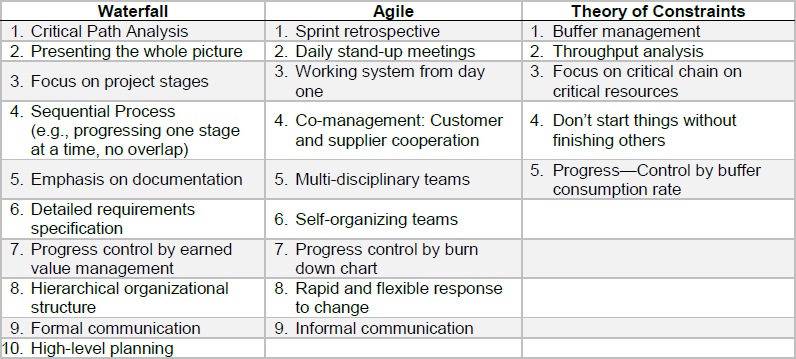
















.webp)


.webp)
.webp)
.webp)

.webp)
